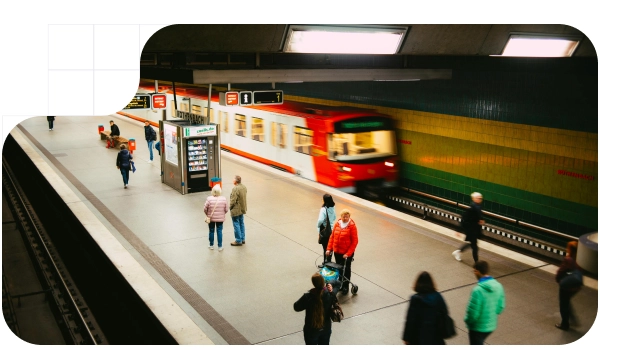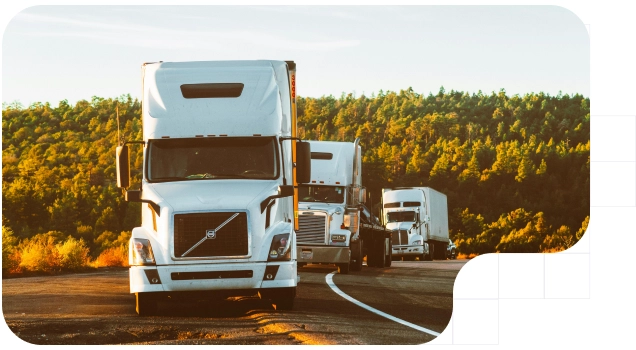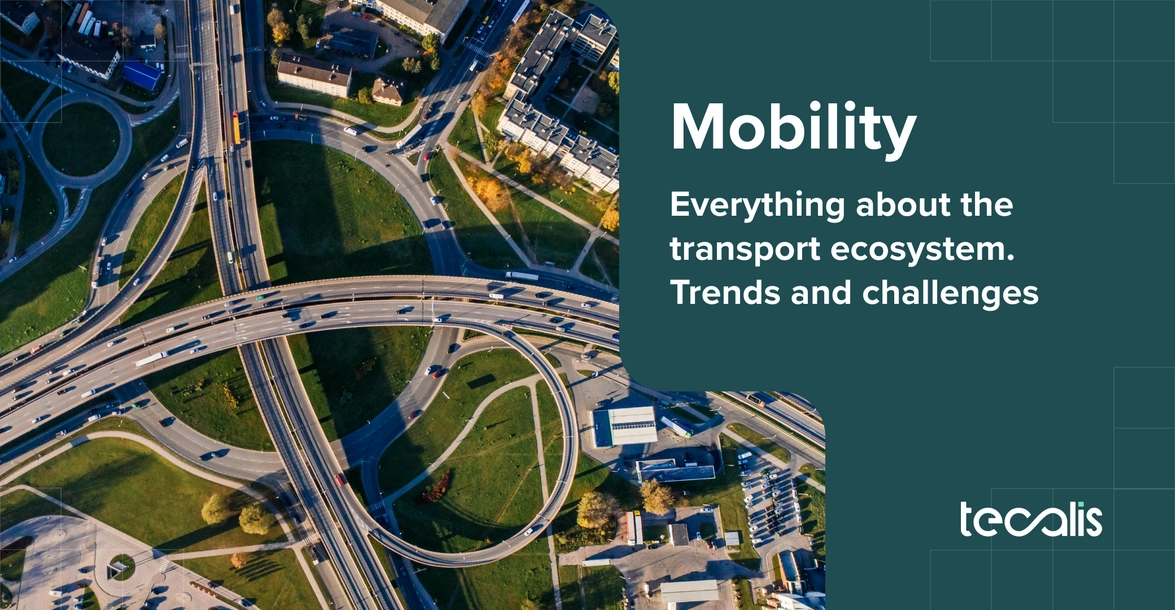Index
Get the latest news right in your inbox
Urban mobility and companies dedicated to both passenger and freight transportation have evolved at a dizzying pace in recent years. The concept of "mobility" has emerged as an integral phenomenon that encompasses not only the transportation of people, but also the transformation of logistics, vehicle rental, and the adoption of new technologies.
Next we will delve into the mobility ecosystem, analyzing its meaning, trends and latest news, regulations and innovative tools that are revolutionizing the industry and the business around it.
Everything about Mobility: What does it mean?
Mobility refers to the set of solutions that enable the movement of people and goods in an efficient, sustainable and accessible manner. It goes beyond simple physical transportation, encompassing technological, social and environmental aspects. In this sense, mobility is a multidimensional concept that is integrated with daily life, the economy and urban planning.
In the last decade, we have seen a significant increase in attention to the mobility sector, driven by urbanization, climate change and technological development. The main goal of modern mobility is to create systems that minimize environmental impact while optimizing transportation efficiency.
Thus, when we talk about this concept, mobility is an integral ecosystem that encompasses the different means of transportation and movement of people and goods, including traditional vehicles, new modes of shared transportation, logistics and supply systems, infrastructure, regulations and technologies that enable and support these systems and businesses dedicated to transportation.
The term mobility goes beyond simple physical movement, encompassing the entire set of services, solutions and tools that facilitate and optimize the mobility of people and goods. It ranges from traditional means of public and private transportation (buses, subways, cabs, rental cars, etc.) to new emerging models such as car sharing, bike sharing, scooter sharing, ride hailing and other forms of shared or on-demand transportation.
Mobility industry and ecosystem
Mobility and transport also encompasses the technological innovations that are transforming the sector, such as electric, autonomous and connected vehicles, mobility applications, intermediation platforms, integrated payment and invoicing systems, logistics and supply chain AI solutions, and many more.
It is a paradigm that prioritizes access to mobility over ownership, providing users with a wide variety of options to move around in a flexible and efficient manner. This paradigm shift has been made possible by the development of technologies such as mobile applications, digital onboarding systems, the Internet of Things (IoT) and artificial intelligence, which have enabled the creation of digital platforms that connect users and mobility service providers.
The mobility sector is a complex and constantly evolving ecosystem that involves multiple players, from traditional vehicle manufacturers to new providers of shared mobility and technology solutions. Among the main players that make up this mobility ecosystem are:
- Traditional rental companies: Businesses that have had to adapt to new market demands by including vehicle renting and leasing models.
- Traditional vehicle manufacturers: Automotive companies that are investing in electric and autonomous mobility, such as Tesla and Volkswagen.
- Governments and public entities: Establishing policies and regulations to facilitate sustainable mobility.
- Technology: Companies that develop software and hardware to improve the user experience, such as navigation applications and fleet management platforms.
- Infrastructure providers: construction companies, parking lot operators, electric vehicle chargers, etc.
- Logistics, supply chain and distribution companies: Logistics operators, carriers, distributors, etc. that adapt to new mobility and transport trends.
New business and players in the sector
In terms of new business models that are transforming the way people and goods move, we can find a wide variety of disruptive players that are creating a diversified ecosystem that responds to the changing needs of society. Among the most prominent types of mobility industry businesses are:
- Micromobility companies: They offer rental services for electric scooters, bicycles and other personal mobility vehicles.
- Ride-hailing and pooling platforms: Connect passengers with private drivers through mobile applications.
- Renting, leasing and pay-as-you-go insurance: They provide vehicles to drivers in a totally flexible way with no commitments or permanence in many cases.
- On-demand public transportation services: Adapt public transportation routes and schedules to the needs of users.
- Shared mobility companies: Operators of car sharing, bike sharing, scooter sharing, ride hailing, etc. services such as Uber, Bolt, FreeNow, Lime, Tier, etc.
- Corporate mobility: Companies that offer mobility solutions to their employees, such as car-sharing fleets or incentive programs for the use of sustainable transportation.
- Mobility as a Service (MaaS): Platforms that integrate different modes of transportation and complementary services into a single application, allowing users to plan their trips easily and efficiently.
- New electric and autonomous vehicle manufacturers: Tesla, Rivian, Waymo, Cruise, etc. are developing and introducing vehicles with alternative propulsion and autonomous driving capabilities.
All these players, together with the traditional players in mobility and transportation, make up an interconnected and constantly evolving ecosystem, introducing new business models, technologies and services that transform the way we move and transport ourselves.

Latest mobility trends and news
The mobility sector is constantly evolving, and some of the most prominent trends recently under review cannot go unnoticed. In the near future, we will see major change in the following aspects of the mobility and transport sector:
- Regulation and public policies: Governments and institutions are establishing regulatory frameworks and incentive programs to encourage the adoption of new forms of mobility, requiring changes to new mobility platforms.
- Electrification: The transition to electric vehicles is being driven by government policies and consumer demand. According to a report by the International Energy Agency, the number of electric vehicles on the road is expected to reach 145 million by 2030.
- Autonomy: Autonomous vehicles are gaining ground. Companies are investing in technologies that enable autonomous driving, which could revolutionize public and private transportation.
- Sustainability: The pressure to reduce carbon footprint has led many companies to adopt more sustainable practices, from the use of renewable energy to the implementation of shared mobility solutions.
- Multimodal integration: Mobility is no longer limited to a single mode of transportation. Applications are starting to integrate different modes of transportation (buses, bicycles, trains) to offer users a more seamless experience.
These trends, together with the development of enabling technologies such as 5G connectivity, e-signatures, eIDAS 2 wallets, artificial intelligence and big data, are giving rise to a mobility ecosystem that is constantly evolving and innovating.
Data Protection Agencies: What do they require from mobility companies?
Data Protection Agencies and Mobility Regulators play a crucial role in regulating the processing of personal data in the mobility sector. Companies operating in this field must comply with the General Data Protection Regulation (GDPR) and other specific regulations.
In the context of the mobility sector, the AEPD has established a series of requirements and guidelines that companies must comply with when processing the personal data of their users:
- Non-storage and minimization of data: Companies in the industry may not store sensitive data such as identity documentation or driving licenses, as well as other information. They must use RegTech players and QTSP providers that do the analysis and verification of these according to standards such as eIDAS, AML and RGPD.
- Secure Onboarding: The registration process of new users must be secure and comply with current regulations, guaranteeing the veracity of the information provided with checks validated by the QTSP without the need to store the information, making a disclaimer thanks to this.
- Informed consent: Companies should ensure that users understand what data is being collected and for what purpose.
- Transparency: They must provide clear information on how the data will be used and the rights that users have over them.
Compliance with these requirements is fundamental and mandatory for companies in the mobility sector or else they will be severely penalized, since the protection of users' personal data is a key aspect in the relationship of trust and the provision of mobility services in the digital environment.
E-signing and KYC onboarding for mobility platforms and business
Electronic signatures and identity verification are essential components in the mobility sector, especially in processes such as car rental and the creation of accounts in shared mobility digital platforms, ride hailing and pooling. Electronic signatures allow companies to ensure the authenticity of documents without the need for paper, and to carry out contracting and new customer registration processes instantly, facilitating faster and more efficient transactions.
Electronic signature in contracts and agreements
- Subscription of car rental or car sharing agreements
- Acceptance of terms and conditions of service
User identity verification
- Registration, onboarding and KYC identity verification of new users in mobility platforms and apps, leasing, etc.
- Access to restricted or personalized services
- Fraud prevention for all types of mobility and transport businesses
Digital invoicing and payments
- Issuance of electronic invoices for mobility services
- Payment processing through gateways and digital wallets
- Claims and returns management
Regulatory compliance
- Identification of users and drivers for compliance with legal requirements
- Identity authentication in shared mobility and logistics processes
- Electronic signature for deliveries and receipts in delivery and transport of goods
Electronic signature and digital identity verification solutions, based on technologies such as biometrics and advanced electronic signatures, enable mobility companies to streamline and secure these key processes, improving the user experience and ensuring regulatory compliance.
Compliance: regulations and laws affecting the industry
Compliance is essential in the mobility industry, where various regulations impact the way companies operate. Some of the relevant regulations include:
- General Data Protection Regulation (GDPR): As mentioned above, this law is fundamental for the protection of personal data.
- Standards for digital identity, payments, authentication, electronic signature and MaaS technology systems: Here we find eIDAS, AML, DORA Regulation, NIS2 and PSD2 (SCA).
- Liability in case of accidents: Mobility companies must have adequate insurance to cover damages caused to third parties in case of accidents. The digital contracting of insurance with electronic signature is crucial for these cases.
- Transport regulations: Laws regulating the safety and operation of vehicles, including regulations on electric and autonomous vehicles.
- Regulations on personal mobility vehicles: Vehicles such as electric scooters and bicycles are subject to specific regulations regarding their use on public roads.
- Environmental legislation: Regulations requiring companies to reduce their environmental impact, promoting sustainability in their operations.
- Labor regulations: Rules governing working conditions for drivers and employees in the mobility sector.
- Tax regulations: Taxes and fiscal obligations that companies in this sector must comply with.
Failure to comply with these regulations can result in significant penalties, so it is crucial that companies keep up to date with RegTech tools and comply with all applicable laws automatically, affordably and easily.

MobilityTech: new tools and solutions to enable new use cases and business models
Technology is playing a key role in the evolution of the mobility sector. New MobilityTech tools and solutions are enabling companies to innovate their business models and improve the user experience. Some of the key technologies include:
Integrated mobility platforms
- Apps and ecosystems that allow users to plan, book and pay for different modes of transportation (public, private, shared) in a single experience.
- Mobility-as-a-Service (MaaS) solutions offering subscriptions and multimodal mobility packages.
Connected and autonomous vehicle technologies
- Driving assistance systems (ADAS) and vehicles with autonomous driving capabilities.
- Sensors, V2X communications and connected fleet management platforms.
Shared mobility solutions
- Car sharing, bike sharing, scooter sharing and ride hailing platforms and applications.
- Integrated reservation, unlocking and billing systems.
Logistics and last mile
- Route planning and optimization tools.
- Delivery and distribution solutions with electric vehicles, drones and robotics.
Infrastructure and energy
- Charger networks and charging stations for electric vehicles.
- Energy management technologies and storage systems for electric mobility.
Analytics and data
- Mobility intelligence platforms that process and analyze data from multiple sources.
- Demand forecasting, fleet optimization and decision making tools.

Transport and logistics: news and trends
Transport and logistics are key verticals of the mobility ecosystem. MobilityTech's integration of tools is enabling companies to optimize their operations and improve supply chain efficiency. Some of the highlights include:
- Supply chain optimization: Companies are using advanced technology to manage and optimize their supply chains such as e-procurement solutions, from planning to delivery.
- Last mile logistics: The focus on efficient product delivery in urban areas is leading to the adoption of innovative solutions such as drones and electric vehicles.
- Integration of transportation modes: Multimodal mobility is allowing users to combine different modes of transportation (bicycles, buses, trains) for a more seamless experience.
- Route optimization and planning: Fleet management and routing systems that use real-time data and AI algorithms to plan more efficient routes. Brokerage and matching platforms that connect carriers with shipments and cargo.
- Shared mobility: Platforms that allow the grouping and consolidation of shipments to optimize occupancy and efficiency.
In conclusion, the mobility sector is in full transformation, driven by technological innovation and the demand for reliable service solutions. From the electrification of vehicles to the implementation of MobilityTech and RegTech tools, the future of mobility promises to be more efficient, accessible and environmentally friendly. Companies that embrace these trends and comply with current regulations will be better positioned to thrive in this dynamic ecosystem.
























